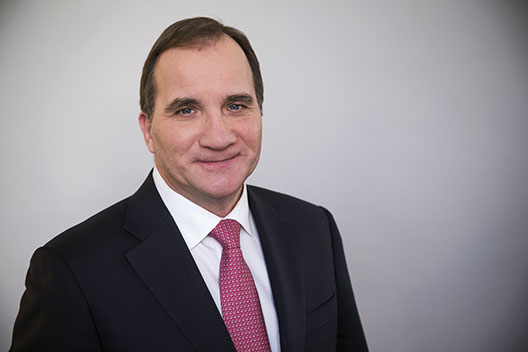
Resistance against free trade is growing in the U.S. and the West. Stefan Löfven, on the other hand, is a role model in his defense of openness.
Trump or Clinton? The U.S. presidential elections are looking like a fatal choice between a dangerous madman and a professional politician. However, for free trade policies it makes less of a difference who will be the 45th U.S. president. Both candidates are now trying to play on the electorate’s resistance to free trade. The Democrat Hilary Clinton is doing everything to distance herself from her previous support of various free trade agreements, making statements that will be very difficult to take back if she reaches the White House.
The situation for free trade supporters in Europe is just as bad. Support for the Trans-Atlantic Trade and Investment Partnership, a free trade agreement with the U.S. that would create a common market consisting of 800 million people, is quickly diminishing. President Francois Hollande of France has said that he opposes the agreement in its current form, and in important Germany, demonstrations against the TTIP have drawn the biggest crowds since the Iraq war. Two-thirds of Germans are against the agreement.
The same scapegoat phenomenon that affects the European Union also affects free trade. Too many blame all sorts of issues on free trade, while all too few are willing to recognize the enormous advantages that come from companies being able to trade freely.
Of course, it is important that agreements protect the consumer and contain measures that safeguard against negative effects on the environment. However, many critics of free trade appear to believe that the alternative to the proposed agreements is the status quo. That is naive. If democracies such as the EU countries and U.S. don’t want to create rules for global trade, others will. China is already waiting in the background, prepared to launch its own alternative in the form of an Asian agreement if the U.S. does not deliver.
This is why free trade agreements are not just a financial issue, but also a highly political one. The TTIP agreement would strengthen the tie between Washington and Brussels at a time when violence is moving the borders of Europe. An agreement between 12 Asian countries and the U.S. would also be a powerful blow against China’s ambitions to dominate its close surroundings.
It is hardly surprising that both Russia’s Vladimir Putin and China’s Xi Jinping are pleased that negotiations aren’t going smoothly.
Former union leader Stefan Löfven has disappointed the business community on many points since he got elected as Swedish prime minister. However, he has not given way to the protectionist trends dominating the Western world, despite forces within both the Green Party and his own party pushing for such measures. On the contrary, the government has been refreshingly clear on this topic.
Free trade does not increase divisions, EU and Trade Minister Ann Linde argued in the Monday edition of Today’s Industry, using as an educational example of how Sweden has managed to become a richer country despite the loss of hundreds of thousands of jobs in manufacturing industries like steel, textiles and shipbuilding.
If only more politicians on the world stage were as wise.

But why do investors want these agreements in the first place? Because “free” trade grants them freedoms: freedom from any responsibility to labour; freedom from any responsibility to nonhuman nature, i.e., the environment; freedom from the burdens of sovereignty (and by extension democracy). Unless signatories get those freedoms, don’t expect them to draft or sign on to any trade deals.
See what the eminent economist Martin Wolf has to say on the subject: “Capitalism and democracy under strain: To maintain legitimacy, economic policy must seek to promote the interests of the many not the few” (Financial Times, Aug 30, 2016).
No sane working class person of any nation state will applaud the irrationality of global capitalism. What works for plutocracy fails miserably for the working class.
As a democratic socialist I have no friendly advice for ” Wall St. Hillary ” or for right wing nationalist Donald Trump .
The Green Party talks about ” socialism ” as much as Hillary Clinton. I can only offer it ” critical support ” when it tells the truth to working class people.
[ http:radicalrons.blogspot.com]